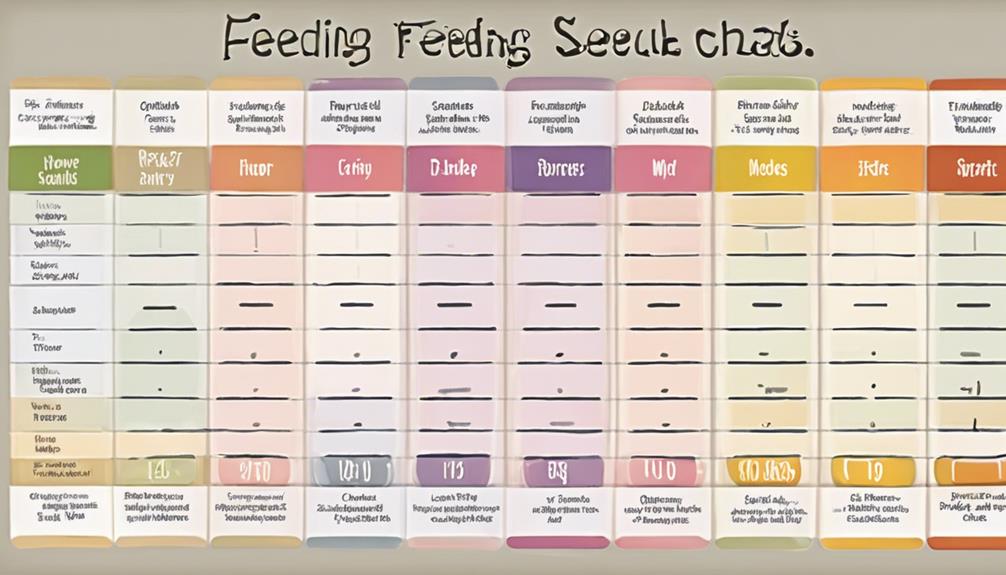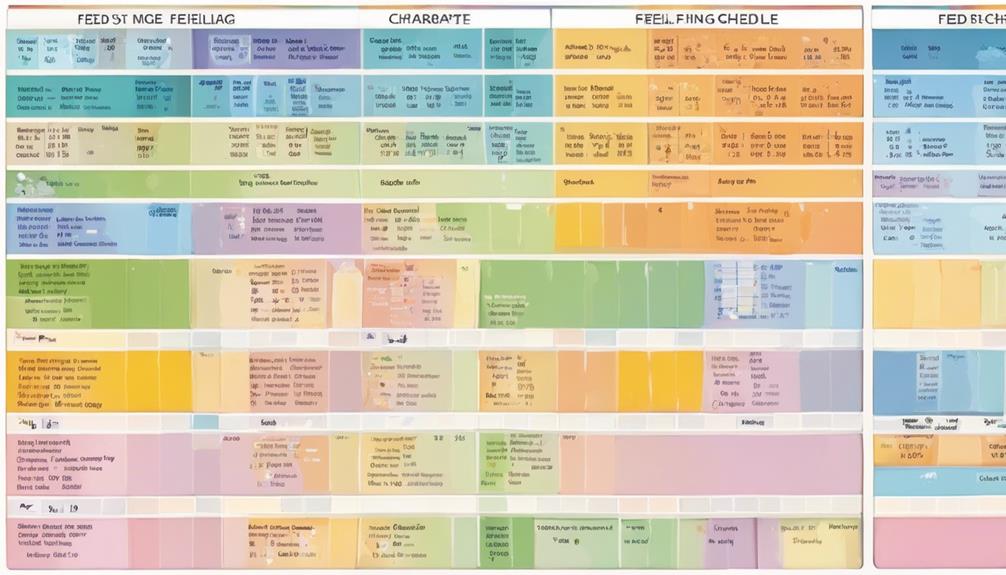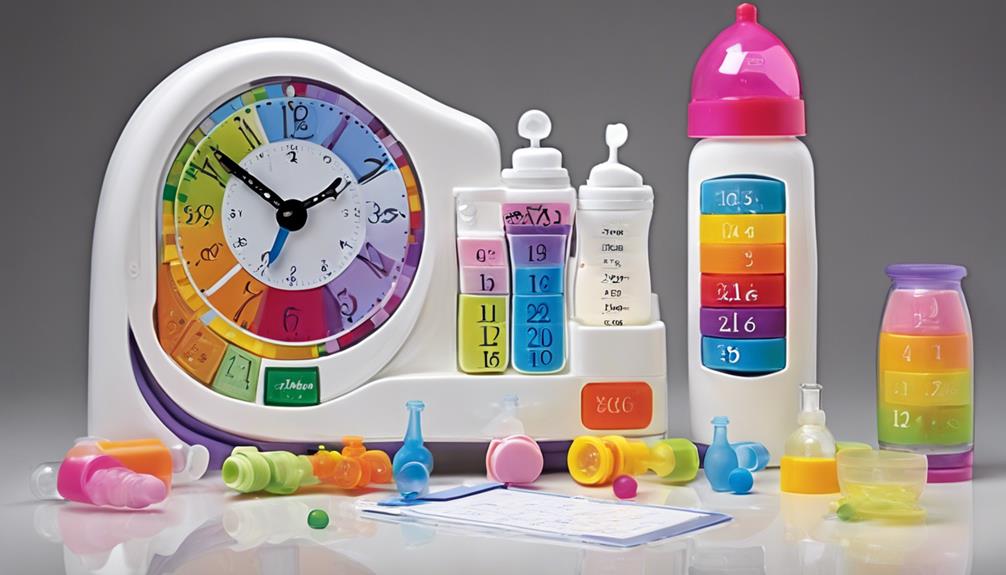Balancing the responsibilities of guiding and caring for a baby can be both rewarding and difficult.
When it comes to establishing a feeding schedule for your 6-week-old, finding the right formula guide can make all the difference in ensuring your baby's well-being.
But how do you determine which approach is best for your little one? Stay tuned to uncover essential tips and insights that will help you confidently steer this vital aspect of your baby's development.
Key Takeaways
- Observe hunger cues like sucking or hand movements.
- Offer 24-32 ounces of formula daily over 6-8 feedings.
- Adjust feeding amounts based on the baby's cues.
- Establish a structured feeding schedule every 2-3 hours.
Establishing a Routine for Feeding
When establishing a feeding routine for a 6-week-old baby, it's important to observe and respond to their hunger cues to determine the appropriate amount of formula to offer during each feeding session. Bottle-fed babies at this age generally consume around 24 to 32 ounces per day, spread out over six to eight feedings.
Monitoring hunger cues like sucking, rooting, or hand-to-mouth movements can guide caregivers in understanding when and how much to feed the infant. It's essential to be sensitive to the baby's signals and avoid overfeeding by following their lead.
Typically, infants need about 2.5 ounces of formula per pound of body weight each day. Solid foods aren't yet recommended at this stage, so formula remains the primary source of nutrition.
Recommended Formula Amounts for 6-Week-Olds

To guarantee excellent nourishment for a 6-week-old infant, caregivers should provide approximately 2 to 2½ ounces of formula per pound of the baby's body weight each day. This means that a 10-pound baby would require around 20 to 25 ounces of formula daily to support healthy growth and development.
Being attentive to the baby's appetite and feeding cues is crucial, as individual variations may necessitate slight adjustments in feeding amounts. Monitoring the baby's growth is vital in determining if the current feeding regimen is adequate or if modifications are needed.
Consulting with a pediatrician is highly recommended to make sure that the baby is receiving the appropriate amount of formula for best health and development. By following these guidelines and staying attuned to the 6-week-old baby's needs, caregivers can help promote a foundation for healthy growth and well-being as recommended by the American Academy of Pediatrics.
Creating a Structured Feeding Schedule
Let's establish a consistent feeding routine for your 6-week-old infant by structuring their formula intake at regular intervals throughout the day. Begin by feeding your week-old baby formula every 2-3 hours, offering around 2-3 ounces per feeding during this initial stage.
It's important to pay close attention to hunger cues such as rooting or sucking on hands, signaling that your baby is ready to eat. As your baby grows, you may notice longer stretches between feedings, prompting adjustments to the feeding schedule.
Consulting with your pediatrician is important to make sure that the feeding schedule you establish aligns with your baby's changing nutritional needs. By staying attuned to your baby's hunger signals and seeking guidance from a healthcare professional, you can create a structured feeding routine that supports your little one's growth and development effectively.
Addressing Common Formula Feeding Concerns

Addressing common formula feeding concerns requires vigilant observation of hunger and fullness cues to prevent feeding issues. When considering how often to feed your infant, it's important to watch for signs of hunger or satisfaction to determine the appropriate schedule. To make sure you're providing the best nutrition for your baby, consult with a pediatrician who can offer personalized advice on the proper ounces of formula per feeding. Remember, maintaining a structured schedule of formula feedings throughout the first year is vital for your baby's development and health.
- Monitor Hunger Cues: Pay close attention to your baby's signals of hunger and fullness.
- Consult with a Pediatrician: Seek professional guidance on the best feeding practices for your baby's needs.
- Maintain Proper Schedule: Stick to a consistent routine to make sure your baby gets the right amount of nutrition.
- Stay Informed: Keep up to date with the latest guidelines on baby formula preparation and feeding practices.
Tips for Successful Formula Feeding
When considering successful formula feeding practices, it's essential to prioritize following the guidelines recommended by your pediatrician for your newborn. Monitoring your baby's hunger cues is important in ensuring they eat the right amount of formula per pound of body weight. It's important to feed your baby according to their needs and not on a strict schedule. Following your baby's cues helps establish a healthy feeding routine that meets their individual requirements.
Preparing formula correctly is important for providing the necessary nutrients for your baby's growth and development. Always adhere to the formula guidelines provided on the packaging and avoid adding water unless instructed by your healthcare provider. Diluting the formula can compromise your baby's nutrient intake and overall health.
Establishing a feeding schedule can help you track your baby's intake and ensure they're getting the right amount of nutrients. By following these tips and being attentive to your baby's cues, you can create a successful formula feeding routine that supports their well-being.
Frequently Asked Questions
How Much Formula Should a 1 Week Old Eat?
We aim to provide a personalized feeding guide for newborns. A one-week-old baby typically consumes 1.5 to 3 ounces of formula per feeding, with 8 to 12 feedings daily. Responding to hunger cues promptly and consulting healthcare providers for individualized advice is crucial.
What Is the Feeding Schedule for a 1 Week Old?
We feed our 1-week-old baby every 2-3 hours, totaling 8-12 feedings in 24 hours. They consume 1.5 to 3 ounces per feed. We watch for hunger cues like sucking on fists. Consult your pediatrician for personalized guidance.
What Is the Schedule for a Formula Fed Baby?
We feed our formula-fed baby every 2-3 hours, offering 2-3 ounces per feeding. Watching for hunger cues like rooting helps us know when it's time. Our pediatrician guides us based on our baby's needs.
When Can You Stop Feeding Baby Every 3 Hours?
We can typically stop feeding babies every 3 hours around 2-4 months when they show signs like longer sleep stretches. As they grow, babies may naturally space out daytime feedings. It's important to follow their cues and adjust the schedule accordingly, consulting a pediatrician for personalized guidance.
Conclusion
In summary, orchestrating your baby's feeding schedule can be as intricate as directing a symphony. By following the guidelines outlined in the 6-Week-Old Feeding Schedule: Formula Guide, parents can guarantee their little one receives the nourishment they need to thrive.
Remember, each baby is unique, so tuning into their cues and signals is key to finding the perfect rhythm for feeding success. Stay informed, stay attentive, and enjoy the harmonious bond that comes with feeding your precious bundle of joy.









